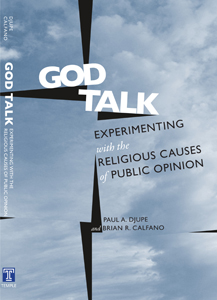This is a guest post by Denison University’s Paul Djupe and Missouri State University’s Brian Calfano. Their book, God Talk, was published last month.
Experiments are one of the best tools in science. In an experiment, a researcher gives one group a “treatment” and then compares that group to the “control group” that did not receive the treatment. Experiments are used for all kinds of studies, but they are difficult to do with religion. We can’t randomly decide who must be religious and who cannot—or can we? Could researchers find ways to “control” religious experience in any sort of realistic way? It turns out that there have been a number of creative attempts to do just that and their results are helping us sort out religion’s role in politics.
Here are two lessons that we have learned from experiments on religion and politics.
1. “God talk” can be effective as long as it’s not blatant
In 2006, David Kuo wrote a tell-all book about his experience working with George W. Bush as Deputy Director of the Office of Faith-Based and Community Initiatives. Among his accounts was the practice of placing “God talk” or coded statements into Bush’s speeches that would be known only to evangelicals and no one else. Phrases like “wonder-working power” (from the hymn “There is power in the blood”) and “one stray lamb” (from the parable of the lost sheep) would signal to evangelicals that Bush was one of them without scaring off other voters.
Does this kind of strategy work? The short answer is yes. We ran an experiment in which people read about one of two fictitious candidates for public office: one candidate made a statement with an example of Kuo’s God talk and the other did not. Most people saw both candidates the same—the God talk did not matter. But evangelicals read the God talk and responded. Evangelicals viewed the “God talk candidate” as more conservative. They also supported the “God talk candidate” more than other voters.
Candidate’s use of God talk can go too far, however. New research that will appear in Politics & Religion by Bryan McLaughlin and David Wise shows that these cues need to remain coded. Even the most religious reduce their support for a candidate using bold religious cues (compared to a control). A little God talk to signal that a candidate is part of a religious group is helpful, but going too far with religious references will turn off even religious voters.
2. Some aspects of religion support democratic values, some do not
Experiments are also helping us untangle the relationship between religion and support for democratic values. One creative experiment by Pazit Ben-Nun Bloom and Gizem Arikan had people reflect on either their religious beliefs or their religious activity (attending religious services). The researchers then asked each group about their support for civil liberties. Those who thought about their beliefs—which includes a lot of moral judgments—were less supportive of protecting civil liberties. Those who reflected on church attendance, a complex social experience, increased it. In our experiments, we had people reflect on what messages are conveyed through religious experiences. Simply being asked to consider whether or not people should shop at stores owned by fellow believers decreased people’s willingness to extend equal rights to a group they disliked. On the other hand, reflecting on the value of inviting people to church increased political tolerance.
Why is this finding so important? The fact that religion can be “primed” suggests that the politics of believers is not hardwired. Instead, it has to be maintained. People need to hear messages over and over and have them reinforced. It also means that there is the potential for the views of religious people to change over time.





